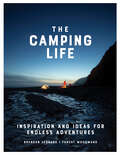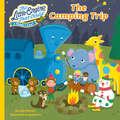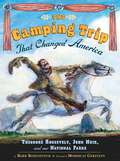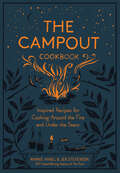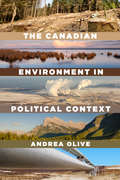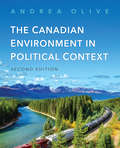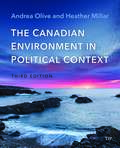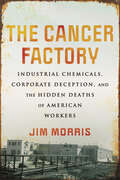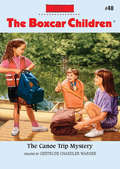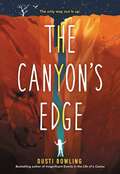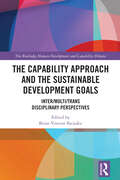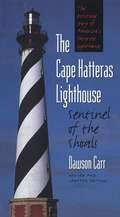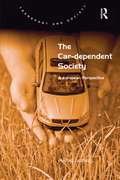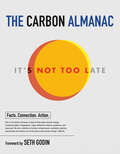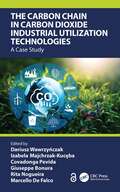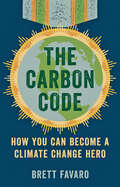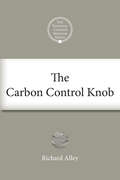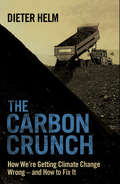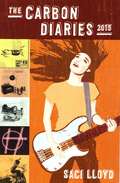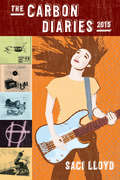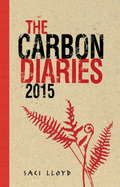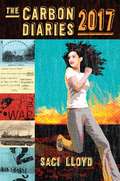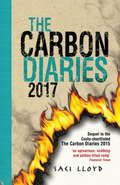- Table View
- List View
The Camping Life: Inspiration and Ideas for Endless Adventures
by Brendan Leonard Forest WoodwardPacked with expert information and inspiring photography, The Camping Life is the perfect invitation to leave the noise and screens behind—if only for a single night—and reconnect with nature. From backpacking to bikepacking, camping while white-water rafting to big wall climbing, outdoor adventurers Brendan Leonard and Forest Woodward cover it all: how to pack a backpack, how to set up a tent in the snow, how to camp with your dog, how to build a campfire, how to judge a river&’s difficulty. And, critically, how to leave no trace, while returning refreshed, recharged, and alive with new experience.
The Camping Trip (The Little Engine That Could)
by Cala SpinnerIt's time to go camping with The Little Engine That Could in this original storybook!The Little Engine That Could is so excited to go camping for the first time! Her friends are determined to make this the best trip ever, but somehow everything seems to go wrong. The hike is too muddy, the lake is too cold to swim in, and some ants got into the marshmallow bag. Can The Little Engine save the camping trip? Read along to find out!
The Camping Trip that Changed America: Theodore Roosevelt, John Muir, and Our National Parks
by Barb RosenstockCaldecott medalist Mordicai Gerstein captures the majestic redwoods of Yosemite in this little-known but important story from our nation's history. In 1903, President Theodore Roosevelt joined naturalist John Muir on a trip to Yosemite. Camping by themselves in the uncharted woods, the two men saw sights and held discussions that would ultimately lead to the establishment of our National Parks.
The Campout Cookbook: Inspired Recipes for Cooking Around the Fire and Under the Stars
by Jen Stevenson Marnie HanelForget freeze-dried astronaut meals and bags of stale, store-bought gorp. Finally, here’s a cookbook that complements the magic of gathering around a campfire and sharing a meal with friends. From the IACP Award–winning authors of The Picnic, which brought taste and style to eating outdoors (in the daytime), comes its companion, for leaving civilization behind and dining under the stars. A mix of dishes to make ahead and meals to cook on-site, The Campout Cookbook includes more than 75 recipes for wood-fired skillet pizzas; backcountry stews and chilies; fire-roasted vegetables and cast-iron breads; unexpected dips, jerkies, and high-energy bars; breakfasts to satisfy that yawning hunger that comes from sleeping in the fresh air; s’mores, of course (including Vanilla Bean Dream Marshmallows & Co. and Dark Chocolate Raspberry Caramel Fire-Ban S’mores); and cocktails, coolers, warm libations for chilly nights, and a Blood Orange Bug Juice. Plus there’s inspiration and know-how for every avid camper and enthusiastic neophyte: How to find a suitable campsite and build a campfire specifically for cooking over, and how to keep it going. Stargazing for city slickers. A troubleshooting guide. And the definitive packing list and camp kitchen essentials. Just add a few scary stories for a truly memorable campout.
The Canadian Environment in Political Context
by Andrea OliveThe Canadian Environment in Political Context is an introduction to environmental politics designed to explain and explore how environmental policy is made inside the Canadian political arena. The book begins with a brief synopsis of environmental quality across Canada before moving on to examine political institutions and policymaking, the history of environmentalism in Canada, and crucial issues including wildlife policy, pollution, climate change, Aboriginals and the environment, and Canada's North. The book ends with a discussion of the environmental challenges and opportunities that Canada faces in the twenty-first century. Accessible and comprehensive, The Canadian Environment in Political Context is the ideal text for environmental politics and policy courses.
The Canadian Environment in Political Context, Second Edition
by Andrea OliveThe Canadian Environment in Political Context uses a non-technical approach to introduce environmental politics to undergraduate readers. First published in 2015, this revised edition features expanded chapters on wildlife, water, pollution, land, and energy. Beginning with a brief synopsis of environmental quality across Canada, this text moves on to examine political institutions and policymaking, the history of environmentalism in Canada, and other crucial issues including Indigenous peoples and the environment, as well as Canada’s North. Enhanced with case studies at the end of each chapter, key words, and a comprehensive glossary, this text addresses the major environmental concerns and challenges that Canada faces in the twenty-first century.
The Canadian Environment in Political Context, Third Edition
by Andrea Olive Heather MillarThe Canadian Environment in Political Context offers an accessible introduction to environmental politics for undergraduate readers. The third edition features new chapters on environmentalism, climate governance, biodiversity, and oceans, while also integrating key topics such as political economy and environmental justice into the existing twelve-chapter structure. The book begins with an overview of environmental quality across Canada and then examines the political institutions and policymaking processes that shape the country’s environmental landscape. It traces the history of environmentalism in Canada and explores critical contemporary issues, including Indigenous perspectives, environmental justice, and the unique challenges facing the North. Enhanced with case studies, key terms, and a comprehensive glossary, this new edition provides a thorough foundation for understanding the major environmental challenges of the twenty-first century.
The Cancer Factory: Industrial Chemicals, Corporate Deception, and the Hidden Deaths of American Workers
by Jim Morris&“No journalist knows more about toxic chemicals in the workplace than Jim Morris. The Cancer Factory is the crowning achievement of his estimable career spent walking fence lines, factory floors, and doctor&’s offices.&”—Dan Fagin, author of the Pulitzer Prize–winning Toms River&“The Cancer Factory could not come at a better time, as we reckon with how our bodies pay the price for our nation&’s toxic history and as today&’s workers fight not for only their rights but for their very lives.… A powerful and essential read.&”—Anna Clark, author of The Poisoned CityThe story of a group of Goodyear Tire and Rubber workers fatally exposed to toxic chemicals, the lawyer who sought justice on their behalf, and the shameful lack of protection our society affords all workersWorking at the Goodyear Tire and Rubber Company chemical plant in Niagara Falls, New York, was considered a good job. It was the kind of industrial manufacturing job that allowed blue-collar workers to thrive in the latter half of the 20th century—that allowed them to buy their own home, and maybe a small boat for the lake.But it was also the kind of job that exposed you to toxic chemicals and offered little to no protection from them, either in the way of protective gear or adequate ventilation. Eventually, it was a job that gave you bladder cancer.The Cancer Factory tells the story of the workers who experienced one of the nation&’s worst, and best-documented, outbreaks of work-related cancer, and the lawyer who has represented the bladder-cancer victims at the plant for more than 30 years. Goodyear, and its chemical supplier, DuPont, knew that two of the chemicals used in the plant had been shown to cause cancer, but made little effort to protect the plant&’s workers until the cluster of cancer cases—and deaths—was undeniable.In doing so it tells a broader story of corporate malfeasance and governmental neglect. Workers have only weak protections from exposure to toxic substances in America, and regulatory breaches contribute to an estimated 95,000 deaths from occupational illness each year. Based on 4 decades of reporting and delving deeply into the scientific literature about toxic substances and health risks, the arcana of worker regulations, and reality of loose enforcement, The Cancer Factory exposes the terrible health risks too many workers face.
The Canoe Trip Mystery (Boxcar Children #40)
by Gertrude Chandler Warner Charles TangThe Alden children go on a classic Mississippi steamboat to visit a family friend in Missouri, there they have to uncover who is responsible for the mysterious happenings near the cabin.
The Canyon's Edge
by Dusti BowlingHatchet meets Long Way Down in this heartfelt and gripping novel in verse about a young girl's struggle for survival after a climbing trip with her father goes terribly wrong. One year after a random shooting changed their family forever, Nora and her father are exploring a slot canyon deep in the Arizona desert, hoping it will help them find peace. Nora longs for things to go back to normal, like they were when her mother was still alive, while her father keeps them isolated in fear of other people. But when they reach the bottom of the canyon, the unthinkable happens: A flash flood rips across their path, sweeping away Nora's father and all of their supplies. Suddenly, Nora finds herself lost and alone in the desert, facing dehydration, venomous scorpions, deadly snakes, and, worst of all, the Beast who has terrorized her dreams for the past year. If Nora is going to save herself and her father, she must conquer her fears, defeat the Beast, and find the courage to live her new life.
The Capability Approach and the Sustainable Development Goals: Inter/Multi/Trans Disciplinary Perspectives (The Routledge Human Development and Capability Debates)
by Brian Vincent IkejiakuThis book demonstrates how the capability approach to human development can contribute to the realisation of the 2015 United Nations Sustainable Development Goals (SDGs).The capability approach dictates that success should not be measured by economic indicators but by people leading meaningful, free, fulfilled, happy, or satisfied lives. Drawing from a range of disciplinary perspectives, this book argues that it is vital that the focus for the SDGs should shift to benefiting the most vulnerable. Case studies from across Asia, Africa, Latin America (Global South), and the United States, the United Kingdom, and Australia (Global North) consider how the capability approach can contribute as a practical framework to achieving the SDGs’ ambitions for social, economic, political, and legal progress.Drawing on insights from a range of disciplines, this book will be of interest to researchers and practitioners from the fields of law, politics, international relations, criminology, international development, sociology, public policy, area studies, and others.
The Cape Hatteras Lighthouse
by Dawson CarrSince 1871 the Cape Hatteras lighthouse has been a welcome sight for sailors entering the treacherous region off North Carolina's Outer Banks known as the Graveyard of the Atlantic. At 208 feet high, it is the tallest lighthouse in the country and one of the state's most famous landmarks. Through the years, it has withstood the ravages of both humans and nature, weathering numerous violent storms and two wars. But perhaps the gravest threat the structure faced in recent history was the erosion of several hundred yards of beach that once stood between it and the ocean. As powerful tides and rising sea levels increasingly endangered the lighthouse's future, North Carolinians debated fiercely over how best to save it, eventually deciding on a controversial plan to move the beacon inland to safety. First published by UNC Press in 1991, this book tells the story of the noble lighthouse from its earliest history to the present day. In this new edition, Dawson Carr details the recent relocation of the treasured landmark. For now, it seems, North Carolinians have succeeded in protecting their lighthouse, as it has protected them for over a century.
The Car-dependent Society: A European Perspective (Transport and Society)
by Hans JeekelCars are essential in modern Western societies. Some even say that our modern lifestyles would have been impossible without cars. The dependency of Western societies on our cars is a unique situation in history, but does not get much attention; car use is seen as just a normal situation. The population at large knows the risks, knows the disadvantages, experiences the advantages and keeps driving. Using data from Western Europe, this book examines three key themes: frequent car use, car dependence, and the future of passenger car mobility in societies. In conclusion, in modern Western risk societies, more attention needs to be paid to car dependence, its driving forces, its advantages, its problems and challenges for the future.
The Carbon Almanac: It's Not Too Late
by The Carbon Almanac NetworkWhen it comes to the climate, we don&’t need more marketing or anxiety. We need established facts and a plan for collective action.The climate is the fundamental issue of our time, and now we face a critical decision. Whether to be optimistic or fatalistic, whether to profess skepticism or to take action. Yet it seems we can barely agree on what is really going on, let alone what needs to be done. We urgently need facts, not opinions. Insights, not statistics. And a shift from thinking about climate change as a &“me&” problem to a &“we&” problem. The Carbon Almanac is a once-in-a-lifetime collaboration between hundreds of writers, researchers, thinkers, and illustrators that focuses on what we know, what has come before, and what might happen next. Drawing on over 1,000 data points, the book uses cartoons, quotes, illustrations, tables, histories, and articles to lay out carbon&’s impact on our food system, ocean acidity, agriculture, energy, biodiversity, extreme weather events, the economy, human health, and best and worst-case scenarios. Visually engaging and built to share, The Carbon Almanac is the definitive source for facts and the basis for a global movement to fight climate change. This isn&’t what the oil companies, marketers, activists, or politicians want you to believe. This is what&’s really happening, right now. Our planet is in trouble, and no one concerned group, corporation, country, or hemisphere can address this on its own. Self-interest only increases the problem. We are in this together. And it&’s not too late for concerted, collective action for change.
The Carbon Chain in Carbon Dioxide Industrial Utilization Technologies: A Case Study
by Dariusz WawrzyńczakA shift towards implementation of renewable energy has disadvantages, such as power availability, storage capacity, and accompanying costs, and therefore the potential of clean fossil fuel technologies to ensure the stability of electricity generation needs to be reconsidered until these challenges will be overcome. These clean technologies can help prevent the greenhouse effect and, at the same time, guarantee energy security, as coal is a widespread, price-stable raw material that is available in large quantities. This book focuses on the carbon chain, starting from the formation of CO2, through its capture, possible cleaning, to the production of useful products such as dimethylether, methanol, and carbonated cement prefabricates. The comprehensive case study presents the research results of an international team established within the "CCS-CCU technology for carbon footprint reduction using bio-adsorbents" (BIOCO2) project.
The Carbon Code: How You Can Become a Climate Change Hero
by Brett FavaroSave the planet—and yourself—by joining the fight against climate change.Our world is getting hotter, and it's our fault. Our addiction to fossil fuels is destroying not only our ancient planet, but our modern civilization. How can we protect our fragile ecosystems while preserving our way of life? How can we respond to climate change deniers who mock the fact that environmental activists use fossil fuels? In short, how can your average concerned citizen live a normal life in a carbon-based economy without being justifiably called a hypocrite? In The Carbon Code, conservation biologist Brett Favaro answers these thorny questions, offering simple strategies to help you reduce your carbon footprint—without abandoning common sense.Favaro's Carbon Code of Conduct is based on the four Rs: Reduce, Replace, Refine, and Rehabilitate. After outlining the scientific basics of climate change and explaining the logic of the code he prescribes, the author describes carbon-friendly technologies and behaviors we can adopt in our daily lives. However, he acknowledges that individual action, while vital, is insufficient. To achieve global sustainability, he insists that we must make the fight against climate change "go viral" through conspicuous conservation.The Carbon Code is a tool of empowerment. People don't need to be climate change experts to be part of the solution! In this book, Brett Favaro shows you how to take ownership of your carbon footprint and adopt a lifestyle of conspicuous conservation that will spur governments and corporations to do the same. Climate-friendly action is the best decision on every dimension—economics, health and well-being, and social justice. Saving the planet is, after all, about saving ourselves. The Carbon Code provides a framework to do this, and helps you to become a hero in the fight against climate change.
The Carbon Code: How You Can Become a Climate Change Hero
by Brett FavaroHow citizens can make realistic, climate-friendly lifestyle changes in a carbon-based economy: “Readable, passionate, and rational.” ?Quarterly Review of BiologyOur world is getting hotter, and it’s our fault—our addiction to fossil fuels is destroying our fragile ecosystems and increasingly wreaking havoc. How can we respond to climate change deniers who mock the fact that environmental activists use fossil fuels? In short, how can an average citizen live a normal, functional life in a carbon-based economy without being justifiably called a hypocrite? In The Carbon Code, conservation biologist Brett Favaro answers these thorny questions, offering simple strategies to help you reduce your carbon footprint—without abandoning common sense.The Carbon Code is based on the four Rs: Reduce, Replace, Refine, and Rehabilitate. After outlining the scientific basics of climate change and explaining the logic of the code he prescribes, the author describes carbon-friendly technologies and behaviors we can adopt in our daily lives. However, he acknowledges that individual action, while vital, is insufficient. To achieve global sustainability, he insists we must make the fight against climate change go viral through conspicuous conservation.The Carbon Code is a tool of empowerment that shows you how to take ownership of your carbon footprint and adopt a lifestyle of conspicuous conservation that will spur governments and corporations to do the same. Saving the planet is, after all, about saving ourselves. The Carbon Code provides a framework to do this, and helps you become a hero in the fight against climate change.“Explains in refreshingly forthright terms how technological advances are making it easier and cheaper to be green.”?Financial Times
The Carbon Control Knob
by Eban Goodstein Richard AlleyOn November 2, 2011, Richard Alley participated in The National Climate Seminar, a series of webinars sponsored by Bard College's Center for Environmental Policy. The online seminars provide a forum for leading scientists, writers, and other experts to talk about critical issues regarding climate change. The series also opens a public conversation, inviting participants to ask questions and contribute their own thoughts. Dr. Alley conducts research on the paleoclimatic record at The Pennsylvania State University in order to understand the history, and perhaps the future, of climate change. In his lecture, Alley gave a concise overview of why we know what we know about climate change, and what that evidence can tell us about today's warming planet. Alley not only provides an accessible science lesson, but reveals his own greatest concerns about climate change and offers advice to those who want to stop debating the subtleties of climate science and act now. This E-ssential is an edited version of Alley's talk and the subsequent question and answer session. While some material has been cut and some language modified for clarity, the intention was to retain the substance of the original discussion.
The Carbon Crunch: How We're Getting Climate Change Wrong—and How to Fix It
by Dieter HelmAn economist&’s take on &“why the world&’s efforts to curb the carbon dioxide emissions behind global warming have gone so wrong, and how it can do better&” (Financial Times). Despite commitments to renewable energy and two decades of international negotiations, global emissions continue to rise. Coal, the most damaging of all fossil fuels, has actually risen from 25% to almost 30% of world energy use. And while European countries congratulate themselves on reducing emissions, they&’ve increased their carbon imports from China and other developing nations, who continue to expand their coal use. As standards of living improve in developing countries, coal use can only increase as well—and global temperatures along with it. Written by an Oxford economist who specializes in environmental issues, this book goes beyond pieties and pipe dreams to address the practical realities that are preventing us from making progress on this crucial issue—and what we can do differently before it&’s too late. &“Should be compulsory reading for the entire political class as well as the bureaucratic elite and the commentariat.&”—New Statesman &“An optimistically levelheaded book about actually dealing with global warming.&”—Kirkus Reviews (starred review) &“A powerful and heartfelt plea for hard-nosed realism.&”—New Scientist
The Carbon Diaries 2015
by Saci LloydIt's the year 2015, a time when global warning has begun to ravage the environment. In response, the United Kingdom becomes the first country to mandate carbon rationing -- a well-intentioned plan that goes tragically awry. This story of one girl's attempt to stay grounded in a world where disaster has become the norm is told in short diary entries.
The Carbon Diaries 2015
by Saci LloydIt's the year 2015, and global warming is ravaging the environment. In response, the United Kingdom mandates carbon rationing. <P><P>When her carbon debit card arrives in the mail, sixteen-year-old Laura is just trying to handle the pressure of exams, keep her straight-X punk band on track, and catch the attention of her gorgeous classmate Ravi. <P><P>But as multiple natural disasters strike and Laura's parents head toward divorce, her world spirals out of control. <P><P>With the highest-category hurricane in history heading straight toward London, chronicling the daily insanity is all Laura can do to stay grounded in a world where disaster is the norm.
The Carbon Diaries 2015: Book 1
by Saci LloydIt's January 1st, 2015, and the UK is the first nation to introduce carbon dioxide rationing, in a drastic bid to combat climate change. As her family spirals out of control, Laura Brown chronicles the first year of rationing with scathing abandon. Will her mother become one with her inner wolf? Will her sister give up her weekends in Ibiza? Does her father love the pig more than her? Can her band The Dirty Angels make it big? And will Ravi Datta ever notice her? In these dark days, Laura deals with the issues that really matter: love, floods and pigs. The Carbon Diaries 2015 is one girl's drastic bid to stay sane in a world unravelling at the seams.
The Carbon Diaries 2015: Book 1 (Carbon Diaries)
by Saci LloydIt's January 1st, 2015, and the UK is the first nation to introduce carbon dioxide rationing, in a drastic bid to combat climate change. As her family spirals out of control, Laura Brown chronicles the first year of rationing with scathing abandon. Will her mother become one with her inner wolf? Will her sister give up her weekends in Ibiza? Does her father love the pig more than her? Can her band The Dirty Angels make it big? And will Ravi Datta ever notice her? In these dark days, Laura deals with the issues that really matter: love, floods and pigs. The Carbon Diaries 2015 is one girl's drastic bid to stay sane in a world unravelling at the seams.
The Carbon Diaries 2017
by Saci LloydIn this riveting sequel to the hit eco-thriller The Carbon Diaries 2015, Laura Brown, now a college student in London, chronicles the struggle England faces as the government tightens its grip on carbon rations. As perceptive and compulsively readable as its prequel, this book raises provocative moral questions for today's young adults.
The Carbon Diaries 2017: Book 2
by Saci LloydIt's over a year since her last diary and Laura Brown is now in her first year of university in London, a city still struggling to pull itself together in the new rationing era. Laura's right in the heart of it; her band, the dirty angels, are gigging all over town until a police crackdown on rioting students forces them out of the city. After a brief exile on her parents' farm, the angels set off in a battered VW bus on a tour of Europe with the fabulous Tiny Chainsaws in the Distance.The tour soon unravels, however, in an increasingly dramatic sequence of events that include drought in Europe and Africa, a tidal-wave of desperate immigrants, a water war in the Middle East and a city-wide face off with the army in London. Not to mention infidelity, betrayal, friendship, love and massive courage.How long can Laura distance herself from the struggle? And more importantly, how can she keep her style and hope alive in a world on the edge of madness?
